Harry Potter: Faith and Superstition
Fair warning: If you are reading this article, it will be assumed that you have read the series or at the very least know who the main supporting characters are. This contains spoilers for Harry Potter 1-7.
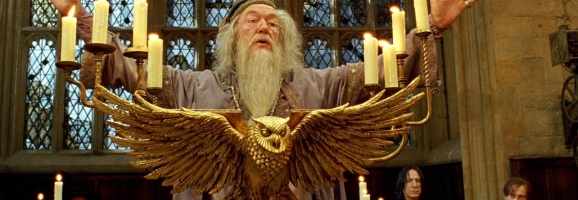
At first glance, the issue of faith and religion is absent from the seven books with few mentions of God, no mention of religion (in the sense readers are used to) and plenty of references to superstition. In fact, once a reader looks at the skeptical bookish Hermione Granger and the very theme of Witchcraft and Wizardry, some have dared to argue that the books are inherently anti-religious.
What is going to be examined is what sort of role faith in general plays in the story of Harry Potter and make a further case that it is much more present that some may think at first glance. What will also be examined is the role of superstition and the similarities and differences it has with the faithful aspect of the series. For inquiring minds, there will be a difference between faith and religion though the two are not unrelated. To study both subjects, one must analyze not only the story but the objects, references, events, and even the characters themselves.
The Superstitious
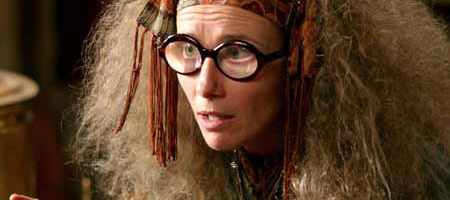
Like Muggles (people who are considered non-magical in the series) have superstitions that almost always foretell bad luck (black cats, breaking a mirror, walking under a ladder), Wizards have magical superstitions. This appears in common sayings as well as Divination and even Beedle the Bard. Wizards are perhaps just as guilty, if not more so than Muggles at believing in superstitious ideals. Unfortunately, the majority of the Wizarding world are superstitious and have an aversion to even using Voldemort’s very name. Some superstitions are given in Harry Potter and the Deathly Hallows as sayings inspired from the Tales of Beedle the Bard.
“Wands of elder never prosper.”
“Jinx by Twilight, undone by Midnight.”
“May-born witches will marry Muggles.”
When the bigotry against Muggle-borns based on superstitions that they are of lesser caliber than Pure-blood Witches and Wizards, the superstition really makes itself known. One of the many encounters with superstition in the series comes in Harry Potter and the Order of the Phoenix. During Care of Magical Creatures, Hagrid gives a lesson on Thestrals which are enormous black horses which have haunted Harry since his arrival at the school that year. As if in confirmation of the haunt, Parvati is frightened.
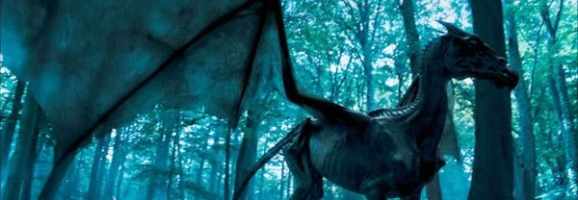
Hagrid passes this off as superstition and counters with the benefits they show while acknowledging the warning against not annoying them, similar to the rule of a Hippogriff. It is worthy to note that Harry had been being pulled by them since Prisoner of Azkaban and nothing happened. In fact, these supposedly unlucky Thestrals later fight the Death Eaters during the Battle of Hogwarts in Deathly Hallows and Harry actually learns to quite like them, even thinking that they look cute once the initial shock at seeing one has subsided.
Professor Trelawney insists they are bad luck simply because she is as superstitious as they come. Throughout the books the audience is led to believe that Divination is not only imprecise, it may be completely useless. This is what Hermione certainly likes to think and McGonagall does not disagree with her. What may surprise plenty is that Professor Trelawney is no fraud. Even outside of her prophecies, she is a very legitimate and gifted seer.
“Beware a red-haired man” to Parvati
“Around Easter, one of our number will leave us forever.” Vague.
“That thing you are dreading, it will happen on Friday, the 16th of October” to Lavender.
The lesson then goes on to the Tea leaves which surprisingly were also pretty good predictions. Harry saw in Ron’s cup a cross (trials and suffering) and a sun (happiness.) Ron had difficulty in deciphering Harry’s teacup. He saw a bowler hat, (work for the Ministry) but then he saw an acorn (unexpected gold.) It was when Ron believed he saw a hippo or a sheep when Trelawney swooped down and looked in herself, going on in another predictive rant.
“The Falcon, my dear you have a deadly enemy.”
“The Club- an attack.”
“The skull- danger in your path, my dear.
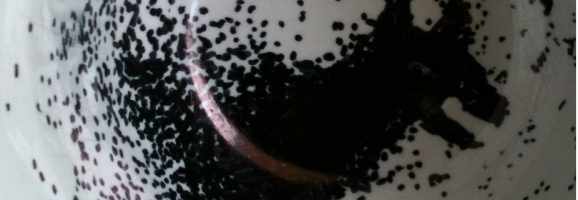
The first prediction to Parvati actually foresees Ron and Lavender getting together, which would greatly annoy Parvati because Lavender is her best friend. It seems incredible that Trelawney made her debut by predicting events three years in advance and it only gets better. She warns Lavender that what she is dreading will happen on a very specific date.On that exact date, Lavender receives news that her beloved baby rabbit was killed. Hermione insists that it is coincidence and that she received the news that day which means it might have happened the day before. Hermione, of course is a skeptic and Trelawney has a prediction for her too. Around Easter, Hermione leaves them forever and never returns.
The tea leaves are rather accurate too. For Ron, Harry saw trials, suffering and happiness. This predicts the events in Deathly Hallows where Ron goes through immense suffering and trials which was what the Deluminator is for, and the sun which could symbolize the Deluminator or the exact happiness in the form of Hermione, the girl he was in angst about to begin with. Afterwards, Ron foresees Harry working for the Ministry and receiving unexpected gold. This of course is right on the mark. Harry does become an Auror for the Ministry. In any case, the windfall of unexpected gold makes its appearance in Goblet of Fire.
But what of the Grim? When Ron had a start when Harry commented that he had seen a giant dog before, Hermione was unfazed, insisting it was a stray and Ron gave a tragic recount of his Great Uncle who had seen a Grim and died a day later and informed her that Grims scare the living daylights out of Wizards. Hermione used that to prove her point.
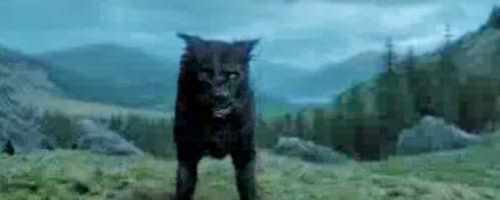
When the readers discover that the so-called Grim that had been haunting Harry from Surrey to Diagon Alley and Hogwarts was Sirius Black all along and no more mention of the Grim is made, it could even be suggested that the Grim never even made a real appearance. That is true superstition with only legends and stories to back up the case that it is an omen. As Hermione said, it is merely a cause of death, not a prophecy.
Despite Hermione’s skepticism, Divination has an excellent track record and Trelawney is a very legitimate seer, even outside her two known prophecies. In fact, the vast majority of her predictions have been spot on. This is easy to prove since the vast majority of her predictions are made during the first Divination lesson in Prisoner of Azkaban.
The only predictions Trelawney fails at are predictions pertaining to death. None of her death predictions come true but all the others, if not most of them are right on the mark. Just because there is truth to Divination does not mean superstition is null. Later in Prisoner of Azkaban, this becomes clear.
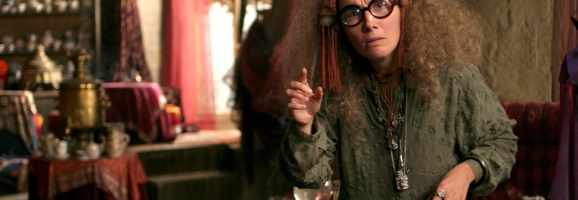
This, of course is superstition. There is no proof of a relationship between thirteen people dining and one of them dying. Harry and Ron rise from the table first that day and neither die. In fact, the first to die of the thirteen was Dumbledore. There is always the possibility that the two of them rising together cancels the prediction out. However, in a world of magic, the absence of proof means nothing.
There are other incidents of thirteen dining together. In fact, in Deathly Hallows thirteen people come to pick Harry up and escort him to the Burrow. They were not dining, thus nullifying the death rule but thirteen, as said by Trelawney is unlucky. Most of the wizards and witches experienced bad luck on the operation. Hagrid and Harry were attacked by Voldemort and thrown into unconsciousness, George lost an ear, Ron and Tonks were delayed, Mundungus fled at the sight of Vodemort and Mad-eye died because of that and all of them were betrayed by Mundungus and attacked by Death Eaters. The bad luck does not end there either. Thirteen people dine in mourning for Moody’s death. The first to rise is Lupin and lo, Lupin is the first to die.
Trelawney’s saying was indeed superstitious but it might have a grain of truth and with the rest of her supposedly superstitious predictions on the mark, Divination all of a sudden does not seem so superstitious. In Half-blood Prince, Trelawney uses cards to tell the future and they are so accurate, it practically spoiled the end of the book.
“Two of Spades: conflict.”
“Seven of spades: an ill omen.”
“Ten of spades: violence.”
“Knave of spades: a dark young man, possibly troubled, one who dislikes the questioner.”
All of those come true easily. Trelawney saw conflict and a dark young man. It is no coincidence that even though she thought the latter cannot be right, she was outside the Room of Requirement where Draco happened to be, the instigator of violence and chaos throughout Half-blood Prince and Deathly Hallows. And finally, on the night of Dumbledore’s death:
“The lightning-struck tower. Calamity. Disaster. Coming nearer all the time!”
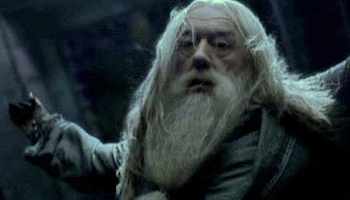
Divination, to the one who believes it, is not as woolly as it is made out to be. Divination in fact predicted very specific events right down to the date. If one has faith that Divination is to be highly regarded, it may just show itself. It has to Trelawney who can now be safely regarded as a not just a nutcase but a very gifted seer. The relationship between faith and superstition comes into play next.
Faith and Skepticism
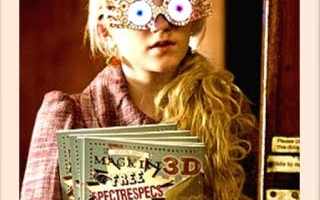
Like superstition, Faith is when one believes something that has no scientific proof whatsoever. It does not mean it is untrue but it does require the strong belief even if there is sufficient reason to believe otherwise. Luna Lovegood has faith in the Quibbler and her father. She is one example of a faithful character in everything she believes and hears. It is almost inspiring. A smart and clever girl in her own right, yet quirky and weird in such a unique way. Even though she is made fun of at school, the audience has learned to love her. A lot of her beliefs, stemming from Xenophilius may indeed be false but readers have learned the Quibbler is not as baseless as some may think. Other theories are possible but unlikely.
The Quibbler houses such fantastical theories that it could be regarded by the wider Wizarding community as the magazine that prints only the untrue drivel. When Harry first reads the Quibbler, he is met with two very amusing theories. Sirius Black is not the man always claimed to be but a Wizarding singer once part of a band called the Hobgoblins and had a date with a fan during the time of the Potters’ murders. We do not know much about the theory of Sirius Black except that Kingsley recommended it to Sirius. The idea, if course is absurd because at the time Sirius was supposedly having a date, the audience knows full well he was tracking Pettigrew down.
If this theory was not crazy enough, Harry reads that Cornelius Fudge secretly wants control of Gringotts and kills Goblins to gain it. Fudge denies it, of course but according the Quibbler, sources close to him insist upon the evidence. Upon Harry’s own reflections, he could see that the articles were so wild. In fact…
“Compared to the rest of the articles in the Quibbler, the suggestion that Sirius might really be the lead singer of the Hobgoblins was quite sensible.”
Sirius might not have been enjoying a date, in fact maybe the one on the date was Regulus but the idea that the handsome boy Sirius Black was really part of the Hobgoblins might actually be sensible compared to the rest of the crazy ideas. It’s not proven but faith never is. It is possible but not proven and Luna certainly believes it as well as whoever sells the Quibbler this stuff to begin with. And if the idea of Fudge cooking Goblins in pies was mad enough, apparently, he’s got an army of fiery creatures and this is when skeptical Hermione Granger flares up.
“After all, Cornelius Fudge has got his own private army. Yes, he’s got an army of Heliopaths… They’re spirits of fire. Great tall, flaming creatures that gallop across the ground burning everything in front of…”
“They don’t exist, Neville,” said Hermione tartly.
“Oh, yes, they do,” said Luna angrily.
“I’m sorry, but where’s the proof of that?” Hermione snapped.
“There are plenty of eyewitness accounts. Just because you’re so narrow-minded you need everything shoved under your nose before you”-
This is the first time they argue, the first time Hermione loses her patience with anyone who is not Ron and is the first time Luna is even angry. Hermione is usually composed and keeps herself calm. Luna is actually the same way. She believes such unusual things. As said, it is possible that Heliopaths are just a figment of Luna’s imagination but it is also possible that Hermione is being narrow-minded. Much like the ever-present issue of death in the series, it is never stated outright who is right and wrong in this regard.
Hermione insists they do not exist against Luna’s word and maybe she is right but we also know that even this is not impossible. This is not a kooky Snorcack theory, this does not involve Wrackspurts or Nargles, all of which are conveniently invisible, but something people claimed to have seen and it can be done. Fire can be Charmed to move, it can be made sentient through almost very basic Charms, and if the audience thinks ahead to Deathly Hallows, a spell similar to her fancies takes shape.
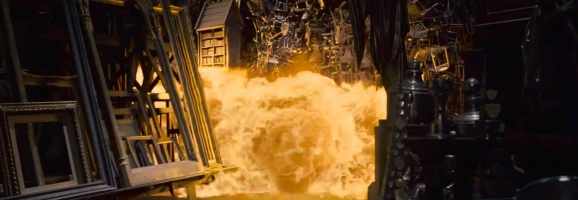
Fudge may not be using the Curse itself but a less intense version of the spell, fiery warriors given sentience and movement. Possible.
Luna’s fantasies against the Ministry are suddenly not as alarming as one may have thought. She pays a visit to the Ministry’s Department of Mysteries and there she finds proof of one insane theory. The group ventures into the brain room where Luna notes that the brains are Aquavirius Maggots bred by the Ministry. Hermione says they are only brains but this time, there is a chance she is wrong. When they visit the room next, Ron summons them as brains and they respond, implying that may indeed be brains. One thing for sure, they are cursed brains. In fact, based on the extensive harm they do to Ron, it is Dark Magic.
This leads to a bunch of questions: What is the Ministry doing cursing brains? Brains, even if they responded, do not act the way they did towards Ron. Who was in on this? Is the Minister aware of what goes on in the Department of Mysteries? Were the brains being bred seeing as how they were being preserved in glass tanks? Perhaps they were brains once but the Ministry (or the Quibbler) renamed them after being cursed. Plus, they were floating eerily in glass tanks (common for bred beings in fiction to be born from glass tanks) so one would not be wrong to assume they were being bred. Whatever they are called, it is clear from that chapter that the Ministry is experimenting and possibly breeding some brain-hybrid creature that attacks upon being summoned. That said, a Ministry and a Minister not above Curses and Dark Magic surely will not be above Cursed fire or drowning Goblins. Unlikely but certainly not impossible.
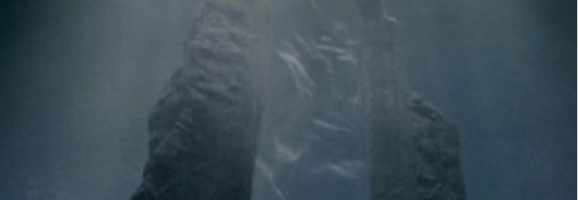
The Veil is one of the more mysterious objects in the series and true to its nature as a one-way trip to death, the readers do not know what exactly it is and why it is there. Supposedly, Unspeakables use this object to study the matter of death. But why was it that it only had an effect on a select few people: Namely Neville, Harry, Luna and Ginny? Some argue that it has an effect on people who have seen death but if so, why is it that it affected Ginny?
What was perhaps one of the most symbolic parts of the series concerning death, Luna speaks sadly of how people took her things. She insists it is ok, that all her possessions come back in the end, and even opens up about her mother’s death. She recalls how horrible it was but points out that it is not as if she would never see her mother again and used those lines to prove it when Harry questioned her further. Death is the one area no one can conclusively prove in the Wizarding world and Luna still believes something so pure and makes Harry feel so much better about Sirius’ death in a way neither Ron nor Hermione ever could.
Luna of course stands as the lone voice of faith among Harry’s immediate peers. Harry himself spends a lot of his time with skeptical Hermione Granger. In the entire series, no one is able to rile Luna up or get under her skin the way Hermione does. In the face of all the superstition and faith in the Wizarding world, Hermione as the Muggle-born witch and the brightest of her age doubts almost all.
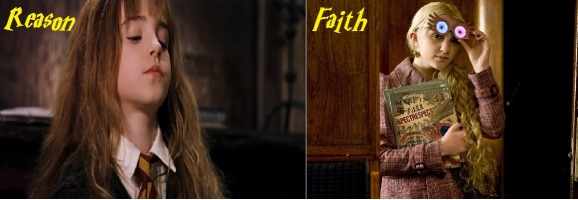
The flare-ups between her and Luna are far and between but most of them take place in Order of the Phoenix. Luna’s first impression of Hermione did not go off well at all because Hermione, as a response to Harry simply reading the magazine unknowingly insulted her father, the editor of the Quibbler. The battle between faith and skepticism has been going throughout the ages. Ever since Biblical times, the divide has been omnipresent and exploited more often than not. Hermione and Luna go to show that even in the Wizarding world, the divide still makes itself known.
When Luna walks out of Herbology class that had with Ginny, her first action is to stroll up to Harry and tell him aloud that she believed him in his story about Lord Voldemort returning. Parvati and Lavender start laughing and Luna shrugs it all off, indifferent to the smirks of others and recalls with her own words.
“You can laugh. But people used to believe there were no such things as the Blibbering Humdinger or the Crumble-horned Snorkack!”
Hermione says those people were right because those creatures of course do not exist. There are no such things as the Blibbering Humdinger or the Crumble-horned Snorcack. Luna, very offended was described as giving her a ‘withering look’ before walking away. Here is shown the second bit of tension between the two, all over whether the Quibbler is rubbish or not and whether her beliefs hold any merit. Harry asks her rather politely to not offend the only people who believe him but Hermione responds with even more impatience.
“Oh, for heaven’s sake, Harry, you can do better than her. “Ginny’s told me all about her; apparently, she’ll only believe in things as long as there’s no proof at all. Well, I wouldn’t expect anything else from someone whose father runs the Quibbler.”
Readers are taught in Deathly Hallows not to dismiss the Quibler so easily. The Quibbler generally prints what the Daily Prophet will not. Because the Daily Prophet is strongly pro-Ministry, it cannot be trusted to report any of the Ministry’s flaws and seeing as how the Quibbler was right about the Ministry in Deathly Hallows, it is even more possible than ever that perhaps Aquavirius Maggots and the Rotfang Conspiracy have some fruit. Soon enough, the Quibbler is the source of actual news.
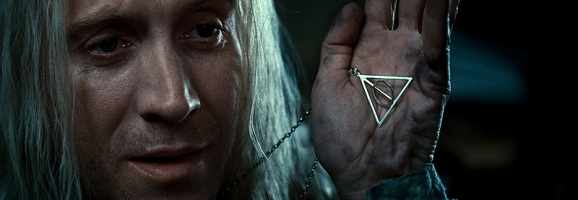
Even with people wise to the Ministry’s corruption in the last book, faith and reason once more clash but this time it reaches a definitive conclusion. Faith wins out and reason and skepticism fall short. This is seen when Hermione meets the man himself, the man responsible for the craziest beliefs Luna has to offer. Luna may now consider Hermione a dear friend while Hermione may have made peace with Luna. In Deathly Hallows she clashes tensely with Xenophilius Lovegood, Luna’s father and the editor of the famed Quibbler.
How would anyone react if they are told that the famous magic mirror from Snow White is an actual object? How would one react if they find the actual tower with no entrance and a lock of golden hair at the base? In the Wizarding world, it is not a Fairy Tale but a legendary object. The talk goes to the Tale of the Three Brothers and the objects known as the Deathly Hallows, the namesake of the book. Xenophilius suggests that the three supposed Fairy tale items actually exist under the name The Deathly Hallows.
Hermione is extremely skeptical of this and so, at first is Ron. She is incredulous that Xenophilius actually believes that those objects exist. An Invisibility cloak is one thing and she notes there are many of them but Xenophilius shoots her down with the fabled true cloak that never wears out. A cloak they realize almost immediately after is Harry’s cloak. She finds little argument concerning the Elder Wand as she knows full well that extra powerful wands were reputed to exist throughout Wizarding history. Her beef is with none other than that which requires the most faith. The Resurrection Stone.
“He saw concern and something less easily definable in Hermione’s expression. Then, as she glanced at Ron, Harry saw that it was fear: He had scared her with his talk of living with dead people.”
For the first time in an argument, Hermione is actually scared of the very idea of resurrecting the dead and talking and living with them. She is frightened when Harry remembers seeing it in Gaunt’s memory. She is terrified that the stone itself may actually be in the Snitch, in working condition. And she puts her best argument up when Xenophilius challenges her to prove that it does not exist.
“But that’s- I’m sorry, but that’s completely ridiculous! How can I possibly prove it doesn’t exist? Do you expect me to get hold of- of all the pebbles in the world and test them? I mean, you could claim anything’s real if the only basis for believing in it is that nobody’s proved it doesn’t exist!”
“Yes, you could,” said Xenophilius. “I am glad to see that you are opening your mind a little.”
It so happens that the frightened Hermione Granger was, for the first time wrong. Through her intelligence on books and wand work, she is indeed painfully limited in the areas of abstract magic. She cannot see in Divination despite the fact that Trelawney obviously can nor can she understand that the Deathly Hallows do in fact exist. In fact, she was not even open to the idea. She rejected it outright and when one was proved to exist, she ignored it and jumped to another. She put so many lines of defense up to reject the idea and Xenophilius alone could shoot down all but one. In the very end of the book, Harry shoots down the last of them.
As established, Hermione is a skeptic in the afterlife. In spite of this, it is strongly implied after Harry used The Resurrection Stone that is not supposed to exist, there is an afterlife. After all, Dumbledore spoke quite easily to him, pure and unharmed, both hands in working condition as always and all memories intact. The very fact that Harry could speak with the dead would infuriate Hermione. However, there still exists one line of defense. Dumbledore’s idea that the Peverell brothers did not really meet death but were instead extremely gifted Wizards.
This seems unlikely. If making an all-powerful wand is as easy as making it from wood of an Elder Tree, all wands would be the same. There would be more than just the Elder Wand itself but no more are spoken of. The magic of reawakening the dead does not exist. It is well established since Goblet of Fire that the dead cannot be brought back yet the stone exists. No spell can do this and a deep magic like this seems by concept right up death’s alley. The same can be said when considering the cloak. No Wizard since the Peverell brothers, not even Albus Dumbledore who is reputed to be the most powerful Wizard of all time could imitate the cloak. If it was as easy as a good Disillusionment Charm, Dumbledore would surely have replicated it when he was in possession of the cloak for the ten years after James died. This type of magic is supernatural even for their standards. They were almost certainly given to the Three Brothers by Death himself.
This of course can now be stated with a reasoned argument instead of the usual leap of faith. Luna would believe in them, Dumbledore certainly did, and Harry followed. Skepticism fought long and hard to disprove the idea and very concept of faith. It took seven books and eight movies but in the end, Luna’s ideas won out and Harry Potter knows with little doubt that there exists an afterlife where his parents, Dumbledore and Sirius are waiting for him. Hermione may disbelieve and she may never be convinced. Neither faith nor reason are meant to convince the other but they can work hand in hand and when they do, the results are incredibly beneficial.
Faith and reason do not always have to fight. Luna grows to love Hermione dearly as evidenced by the emotional picture of friends drawn in her bedroom at home. Sometimes they go hand in hand. Sometimes, they join to fight for the greater good. This is evident when Hermione summons Luna and Rita to The Three Broomsticks to get Harry’s word out. It was not the Department of Mysteries Battle that made Voldemort a reality again, it all started because Hermione and Luna worked together for the common goal.
Faith and reason put aside their differences and in spite of the existing tension between them, especially considering the last time they clashed people slowly started coming to the realization that the Ministry was lying. It also arguably put in place the possibility of it happening again, which is why people do not fall for the Ministry’s lies so easily in Deathly Hallows.
Springing from the Deathly Hallows themselves, the issue of death makes itself present as an almost omnipresent factor. From the beginning, it is a given that the main character is an orphan whose parents were killed. At the very end of the first book, Harry is brought to peace with this fact once the wise Headmaster Albus Dumbledore tells him the first and most important words in the series about death.
“To the well organized mind, death is but the next great adventure.”
This is where the issue of faith comes in. It becomes a sort of fear in the series that death is the end and nothing comes after. However, one elderly man claims otherwise. In this sense, the Deathday Party becomes more than just filler. Unfortunately, the Deathday Party held by Nearly-headless Nick can be seen as boring to a lot of people. In many cases, one could skip the chapter and miss absolutely nothing from the wider perspective of the series or even its message. But the Deathday party serves the audience a taste of what it is like after death.
Despite Hermione’s fears, the audience is given clear indication and reminder that ghosts do exist and they do have memories of their past lives. However, Ghosts have not moved on from life. Nick is mournful every time he is shown and very sensitive to the fact that he is no longer alive, one only needs to look at Moaning Myrtle to be reminded of this. The Grey Lady and the Bloody Baron, both quiet and introverted ghosts are not given significance or a back story till Deathly Hallows. Almost all ghosts are mournful and sad.
There are exceptions to the rule of course. Outside the four-man club of House Ghosts the audience meets the Headless Hunt. The Headless Hunt is a band of ghosts who take joy in the fact that they lost their heads. They have taken what is perceived as an inevitable end and transformed it into a strength, a reason for happiness even in the spectral existence they are eternally stuck in. The Headless Hunt, even as ghosts have moved on.
It is also worthy of mention that Nick is noted to have died on All Hallows Eve, that is to say Halloween. According to the American Desk Encyclopedia, Halloween directly translated means Holy Evening. With the major presence and significance of ghosts on that day in Chamber of Secrets, as well as the fact that Harry’s parents are known to have died on that day, The Deathday Party suddenly holds significance to the subject of not only death, but faith as well. Suddenly, the filler chapter in Chamber of Secrets, the chapter that bored many readers to death holds more significance than most of the chapters in the books when pertaining to the ever-present subject of death.
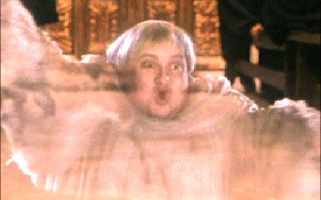
If the reader returns to Luna’s faith in an afterlife regarding the veil, a clear duality between faith and reason makes itself known. In the Death Room, the characters who came into contact with this mysterious object had a variety of reactions. Ron was indifferent, Hermione was scared, Harry was hearing things, Luna heard them clearly, Neville and Ginny were just dazzled.
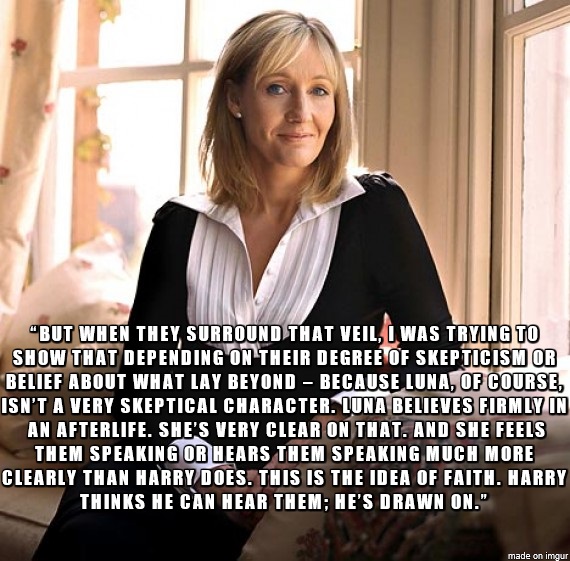
If Rowling’s words are to be taken into account, there is a lot more to work with. Luna hears the veil very clearly, Harry can somewhat hear it, Neville and Ginny were both just entranced, and Ron and Hermione are unaffected. This, according to Rowling’s theory would mean that Luna is a very faithful character, Harry is semi-faithful and semi-curious, Ginny and Neville are skeptical but curious and open to persuasion as shown when they stare in curiosity but can hear nothing, Ron is entirely indifferent and Hermione is impatient and scared.
The issue of faith and reason, skepticism and doubt are more prevalent in the Harry Potter series than commonly thought. Even in the Wizarding world, they manifest in their own forms, fight and sometimes intertwine. Indeed, superstition in the Harry Potter world can closely be tied to faith and skepticism fights both. There is never a clear victor but the battle over the Deathly Hallows and even the legitimacy of the Quibbler goes to Faith itself, death is dealt with in a way some readers may miss due to the mellow mood of the Deathday party. Even that chapter has something to share and all characters ranging from Dumbledore to Trelawney to Hermione and Luna have their own words to give.
What do you think? Leave a comment.











I engaged in a forum starting in early 2001 where I liked to discuss the first four books. Whenever the subject of religion came up, there were those users who are Christians who had seen Christian themes, but what always surprised me was the reaction (over-reaction, really), of those who were of another faith or who claim to be atheists. And after Order of the Phoenix came out and Dumbledore told Harry that it was Love that would defeat Voldemort, some of them were outraged. I left that site for a while because of the arguing that ensued.
These kinds of arguments repel me too. Rather ironic because Christianity claims that God is Love a lot and when Love is said to defeat Voldemort, people go nuts over it like the author did something vile. I’ve been there. Of course, this is why here, I write on faith in general and not religion specifically.
Harry Potter is, simply, pulp fantasy fiction written in a very smart style.
The Harry Potter mythology and Christian mythology both draw from the same well; of course there are similarities! It’s a hero’s journey.
I recall back when the very first book and film was out, there was like a hysteria among US parents regarding how dangerous Harry Potter is, the show 20/20 in it’s “Give me a break” section covered it, at first they interviewed parents, church clerics and all of them painted a very dark image of this satanic little boy, then there were book burning meetings recordings, after that the show interviewed children and all of them just laugh at the idea of Harry Potter being real or having actual powers, they all said that even though they know that, they keep reading it because it was fun to imagine or pretend to have his powers and many kind of identify themselves with Harry.
I remember following the story of angry mom called Mallory who tried relentlessly to ban HP from school libraries. She failed miserably, but hey, they always do. Nonetheless, when I was a kid, I remember taking little wooden sticks with my friends and dueling them.
Great article but I believe people should emphasis the fact that Harry Potter is a fantastic tale rather than giving it credibility by caring about the wrong thing.
This is a great analysis of a huge cultural force. Needles to say, interesting read.
Themes of love, death, etc. are not uniquely in religion and faith but rather universal, so their appearance in the Potter novels does not indicate that the stories are “religious” in nature.
I was not exactly trying to make a point of religion but faith. Death is not unique to religion, no but when it comes to imagining the afterlife, that requires faith. Not religion alone but faith in general.
I always thought the most “religious” theme of the Harry Potter series was how incredibly young many of the characters married and had kids.
We have many religion themes from Rowling:
* A birth foretold by prophesy (something atheist Objectivists would scoff at).
* Sacrificial love is referred to by Professor Dumbledore as an “ancient magic” that Voldemort knows but is terrified of.
* Threatened as an infant by evil forces – goes into hiding as an infant.
* Supernatural power exists that holds sway over animals, time, and matter.
Let’s go all the way…
– The dead are not non-existent: they are with Harry and give him support and comfort. There is an afterlife…
– Griffindor (a good house) is symbolised by a lion; evil is symbolised with a snake.
– Went willingly to his death.
– Came back to life.
– Defeats the forces of evil in a final, glorious battle — but after great sacrifice.
Like Tolkien, a devout Catholic, Rowling has infused her novels with Christian symbolisms, although not to the extent that Tolkien did (a Catholic reading Tolkien’s “Lord of the Rings’ finds all kinds of Catholic symbolism which would be completely lost on the secular reader).
Looking back at reading them growing up, I never put two and two together. Much less any form of modern believe beside Harry Potter. Makes me think…
Fair warning, this may get a bit wayward and rambly. (Which is a word now, autocorrect! Get with the picture!) Anyways, first off: incredibly thought-provoking article. I’ve been looking forward to seeing this piece published since you started talking about it on the messages-thingy. (Another technical term; I’m on a roll!)
I really appreciate how your article can be taken on both a secular and spiritual level of faith. I think that often times Christian critics get too wrapped up in our definitions of faith as faith in God, when oftentimes faith is simply in ::something:: greater than oneself.
I think you did a stellar job at unpacking Trewlawney – someone who I’ve never quite understood but now I find myself wanting to dust off my Harry Potter books and give them another run through for the first time in a few years.
Harry Potter really has spoken to a generation, and I adore fan analysis because it brings together my childhood with everything I spent the last four years in college doing.
Tl;dr amazing piece. 🙂
Don’t worry. I like rambly messages. I’m glad you see the article as more than just a message on religion, I actually meant to write it on faith in general and not to be taken as purely Christian or otherwise. Because of my mention of characters like Hermione, it’s easy for even a skeptic himself to take interest in this.
I am glad you liked my analysis on Trelawney. Granted, it took me about three reads to really get her. I myself majored in English Language and Literature so analyzing things is my job. If I did this right, it means I did not waste four years.
Thanks for your reveiw.
This is a lovely analysis of the faith/reason dichotomy in a series that many don’t see the traditional applications of faith. I do think that the superstitious nature of the wizarding world relies less on faith and more on tradition, few wizards seem to actually believe the mantras from people like Mrs. Weasley. I also think you give Trewlaney a little too much credit for her predictions—I’m not trying to be Hermione here, but she also makes many false predictions.
The presentation of Luna equating faith, and Hermione equating reasoning, is very interesting. Luna is extreme in her faith while Hermione is extreme in her belief in logic and reason, acting as the ends of the spectrum where the rest of the characters can find their way in between.
Overall, great article!
I thought the article was very interesting. I know about some of the controversy that came from these books when they were released but seeing it written out like this was great. What it comes down to for me is that too many groups take things too seriously. They are fantasy books that are very well written. I think sometimes trying to dig into what is behind the books leads to looking for things that are not there. I wish more people could just take things as they are, entertainment.
I find it really interesting that the closest thing to a deity on the Harry Potter novels is Dumbledore… one who manipulates his followers to do what he believes to be the “greater good” while giving them little information and even less choice in the matter.
Rowling’s concept of deity is not very much like the Christian theologian would present it, but it is much like the Bible presents it.
The Harry Potter series are morally and, perhaps, religiously uplifting.
Once you explore the topic, it is quite obvious that Christian themes of love, death, suffering, sacrifice, forgiveness, and trust are deeply integrated into the characters and plot of the novels.
I’m lambasted for allegedly reading too much religion into the Harry Potter books… and on the other side for reading in too little. Of course I maintain that I find just the right amount of religion — the amount that actually exists in the novels.
Great article!
I esp. enjoyed the detailed look at Trelawney. I would have said that she only had the two correct predictions and was utterly bunk otherwise, but you’re correct — she’s right more often than she’s wrong. That’s really interesting. I think I was relying too much on Hermione’s assessment of Trelawney, which is too biased to be reliable.
I was surprised by the Christian backlash against the books, tbh. Perhaps they aren’t as clearly Christian as the Narnia series, but it always seemed to me that a Christian reader could see very positive messages in them.
Ahh who cares. They are good yarns. Not a single person really believes in magic but it certainly makes fun stories. We can label ourselves as the story making species – and we have created millions of great stories. They were created to give a good feeling and some understanding about people – learning without experiencing personally.
Well, novels are not merely entertaining stories that make us feel good. Rather, literature embodies the deepest human values and aspirations. Greatest literature moves people, sometimes radically changes the direction of their lives, and often inspires them to innumerable causes ranging from abolition and other social reforms to space exploration to personal transformation. So the themes of novels read by tens of millions of people should matter to us. Moreover, as readers, understanding the themes of great works of literature helps us better appreciate those works. Of course, if the themes of the Potter novels do not matter to a particular individual, then the solution seems simple enough.
This is a great analysis! I’ll admit I had never thought about this angle before, despite having read each book multiple times.
I suppose that the Death Eaters’ adoration and obedience of Voldemort is somewhat like the deference paid to a deity, except obviously that the ultimate tenet is openly evil rather than self-proclaimed good.
I see a few comments have emphasised how Harry Potter should be left out of too much analysis, and not be take so seriously as mass fiction, but honestly, I think that the continuing interest in it, not to mention the worldwide popularity, does spark a need for its analysis. I agree with Emily in that you give Trewlaney a little too much credit in her prophecies, however, I believe that may have been on purpose after all by Rowling, not only character-wise, but story-wise to ensure that there wasn’t a character that could faithfully plot out every single detail and therefore foil the whole narrative’s action. Great read!
Very interesting. I could read about Harry Potter all day 🙂
So could I. I love HP.
I’ve always felt that the lack of overt religiousness was in itself a commentary on religion for these books. It was nice to read this article as it cemented some of my thoughts on the matter.
I especially enjoyed your analysis of Luna and Hermione’s attitudes toward faith and reason. I have often said that, were I a Hogwarts student, I would be friends with both. I now realize that’s because I see myself in both. 🙂
After reading this article, I wonder if you plan to do follow-ups? I’d love to see one specifically about Christian or other religious elements in the books – that is, whether they exist or not and who they would appeal to. Considering the whole “HP is witchcraft” controversy from when the books first came out–it’s still a reason a lot of Christian parents won’t let their kids touch them–I think that would be a worthwhile discussion.
Personally, Harry Potter seems more like a political allegory, but this is just a thought.